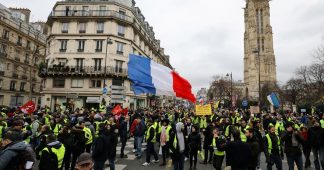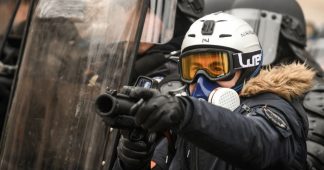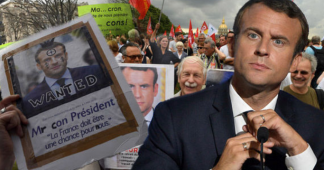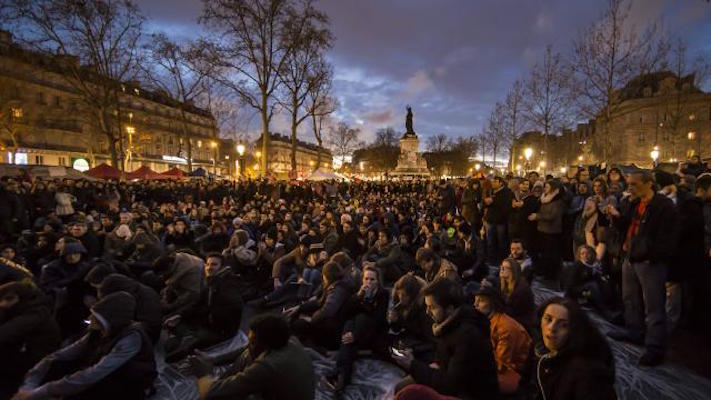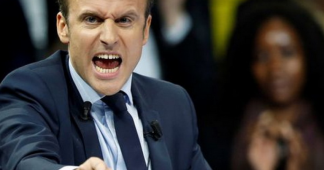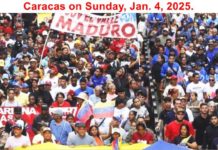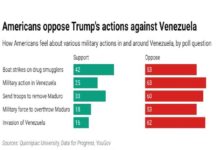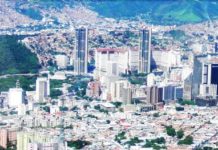Written statement* submitted by the Europe – Third World Centre, a non-governmental organization in general consultative status
The Secretary-General has received the following written statement which is circulated in accordance with Economic and Social Council resolution 1996/31
[8 February 2019]
Pushback on human rights in France: “The Republic on the move”- but in the reverse gear(1)
- For some months now, France has been the scene of turbulent upheaval. Fierce social conflict has long been a defining feature of the country’s political life. It has been a historical given in a nation constructed, for the most part, post-1789 on the basis of a revolution of universal scope that, along with the social advances won in 1936, 1945 and 1968, still exerts a strong hold on the collective memory and the country’s institutions, despite attempts to eradicate all traces of it. Yet for nearly 40 years, France, like all the other countries of the North without exception, has found itself encased in the deadly straitjacket of devastating neoliberal policies, policies that can only be seen as an extraordinary act of social violence, an assault on labour. Their destructive effects – on individuals, society and even the environment – are propagated by a State that works hand-in-glove with whoever currently wields the most power. They are further aggravated by the constraints of the anti-social content of European Union treaties that the French rejected in the 2005 referendum but which were imposed on them in a denial of democratic process – an additional assault on an entire people. It is this particular perspective, as well as the general context of a systemic crisis of global capitalism, that explains the waves of popular uprisings of increasing intensity that have taken place in recent decades – strikes in 1995, riots in the suburbs in 2005-2007, demonstrations in 2000 and 2010. There is now widespread discontent and a general feeling of malaise. The so-called “yellow vests” movement that began in October 2018 is one expression of this, but it is coming up against the worst resurgence of police violence since the Algerian war. In the face of the various protests, all demanding greater social justice, the authorities have chosen to respond with greater repression, to the extent that human rights are regressing at an alarming rate.
State of emergency: origins of the crackdown
2. The starting point for the ramping up of repression can be clearly identified as the state of emergency proclaimed in metropolitan France on 14 November 2015 in the wake of the previous day’s terrorist attacks, and in the overseas departments on 18 November. Without in any way seeking to minimize the threats posed by the terrorist activities of extreme political Islam, from Al-Qaeda to Daesh, it nevertheless needs stating that the security policy in place since 2015 has also provided an opportunity to force the French people to accept a drastic curtailment of their civil and political rights, beyond what is required to deal with terrorist threats alone. It is true that, after five successive renewals, the state of emergency was lifted on 1 November 2017, but most of the special measures it had provided for had by then acquired the force of law: preventive search and arrest, security perimeters, individual house arrest, border controls, etc., are now authorized under the Act of 30 October 2017 on reinforcement of national security and combating terrorism. Since then there has been a perturbing abuse of this extensive legal arsenal of emergency measures that has had the effect of pushing back public freedoms, notably the rights to freedom of expression and freedom of assembly or demonstration, as well as trade union rights and even the right to physical integrity, all of which are now in serious jeopardy.
3. Those who have recently taken part in demonstrations in France will certainly have witnessed what French and international human rights organizations have been decrying for the last few months: many of the actions of law enforcement agencies are deemed disproportionate and excessively violent; they even resort at times to weapons of war. There is now systematic use of tear gas and water cannons on peaceful protesters and very frequent use of baton rounds (from riot guns, fired at head height, and other so-called “less lethal” weapons), stun grenades and dispersal grenades, the practice of “kettling” to prevent groups from joining up with other demonstrators, random and arbitrary arrest, verbal intimidation, gratuitous provocation and even physical assault. The streets of Paris have seen the deployment of armoured vehicles, mounted police and dog units. On numerous occasions degrading treatment has been inflicted on protesters, including minors. In many cases, people who have committed no crime whatsoever have been clubbed or locked up. Medical supplies have been confiscated from “street doctors” – the volunteer medics who follow the marches and treat the injured. All of these events have shocked the French, which is precisely the effect desired, with a view to halting the uprising. Such police violence is absolutely unacceptable and violates international human rights standards.
Phase 1: suppression of social movements and unions
4. Since the election as President of Emmanuel Macron – formerly managing partner of the Rothschild investment bank, then Minister of Finance under President François Hollande and responsible for several laws aimed at making the labour market more flexible – the trade unions have re-mobilized. Demonstrations and strikes have spread, especially in sectors such as public transport (SNCF, Air France), energy (gas and electricity), automobiles (Peugeot, Renault), telecommunications (Orange), mass distribution (Carrefour), health services (public hospitals, retirement homes, social security), education (high schools, universities), culture (museums), justice (lawyers, judges), garbage collection, and even financial and company auditing. These diverse social movements, which attracted a large following, lasted throughout the spring of 2018. The response of the authorities was to step up the repression, with a particularly dramatic impact on students (evacuation of campuses), environmental activists occupying “defence zones” (ZAD) and, before that, those protesting against the labour-market flexibilization laws.
5. This was clearly part of the same spiral of repression already in use against the unions for several years, in violation of labour law. The obstacles in the way of trade union activities had multiplied: pay discrimination against trade unionists, unfair dismissal of strikers, pressure in the form of threats or disciplinary sanctions, curtailment of trade union rights and the right to strike, and even criminalization of trade union action (as at Goodyear, Continental and Air France). In addition, recent government reforms to the Labour Code have further penalized social movements: shorter time limits for appealing to industrial tribunals and caps on those tribunals’ compensation awards in cases of unfair dismissal; restrictions on the role of staff representative bodies and the legal remedies available to them; mechanisms for breaking collective agreements without regard for plans for saving jobs or favouring departures by older staff; reversal of the status of norms so that company agreements prevail over sectoral agreements and the law; establishment of national scope for dismissal for economic reasons, to facilitate the laying off of employees in French subsidiaries (while the parent company makes profits on a global scale).
Phase 2: suppression of the “yellow vests”
6. President Macron has decided “not to change course”. With no regard for the sufferings and expectations of working men and women, his Government is tightening up its neoliberal policies and, to that end, going ever further down the route of social violence and police repression. The record is horrific, unworthy of a country that claims to be democratic and tolerant. Since the start of the yellow vest movement, there have been 11 accidental deaths. More than 2,000 people have been injured, at least a hundred of them very seriously, with doctors reporting injuries they describe as “war wounds” (hands torn off, eyes put out, disfigurement, multiple fractures and maiming), mainly resulting from baton rounds or shrapnel from grenades, in many cases fired at peaceful protesters. Several people are still in a coma. And what of the psychological shock to teenagers treated as terrorists by the police, forced onto their knees with their hands behind their head, or bundled into vans or cells?
7. Where is this power heading, trampling as it does on its own people and unleashing such violence? On 1 December, for example, 7,940 tear gas grenades were fired, along with 800 dispersal grenades, 339 GLI-F4-type grenades (explosive ordnance), 776 baton rounds and 140,000 litres of water. Between 17 November 2018 and 7 January 2019 alone – according to preliminary and probably not exhaustive figures – 6,475 arrests were made and 5,339 people taken into police custody. Nationwide more than 1,000 convictions have been handed down by the courts. Although most of the sentences are subject to adjustment (such as community service), many are prison terms: 153 committal orders (involving incarceration) have been issued, for example, while 519 summonses have been put out by the criminal investigation police and 372 by the criminal courts. In Paris, 249 persons have been sent for immediate trial, 58 have been given prison sentences and 63 suspended prison sentences. In the French department of La Réunion, the average prison term ordered for local yellow vests is 8 months. As of 10 January 2019 there were still some 200 people associated with these events in prison in France.
Legitimacy of popular demands
8. In many respects the demands of the yellow vests intersect with those of labour. They demand immediate and tangible improvements to living standards, restoration of purchasing power (wages, pensions, social benefits), strengthening of public services and citizens’ participation in decisions concerning their collective future. In other words, the effective implementation of economic, social and cultural rights in particular, and peoples’ right to self-determination. Insofar as they call for greater social justice, increased respect for human rights and more economic and political democracy, these claims are thoroughly legitimate and attract broad support among the population.
9. The mother of all violence, the violence that has to be halted first of all and as a matter of urgency, the violence from which people are forced to defend themselves – as suggested by the Declaration of Human and Citizens’ Rights in the preamble to the French Constitution – is that generated by the imposition of unjust, merciless, antisocial and undemocratic neoliberal measures; the violence that, in the silence surrounding the price movements of capitalist markets, causes homeless people to die of cold, pushes indebted farmers to suicide and destroys individuals and families by depriving them of jobs, cutting off their electricity and evicting them from their homes; the violence that forces pensioners to turn off the heating because they can’t afford it, or children to skip a meal; the violence that breaks down all solidarity, closes schools, maternity wards and psychiatric hospitals, plunges small tradesmen and craftsmen into despair as they buckle under their overheads, wears out wage workers but does not let them make ends meet. The real violence is there, in this extraordinarily unjust and fundamentally untenable system. In that light, the smashing of bank or supermarket windows by a few isolated or confused individuals, while certainly reprehensible, is no justification for police violence
10. On that basis, CETIM urges the French Government to call an immediate halt to the crackdown on demonstrators and to honour its international obligations in terms of human rights and labour rights, notably by:
– Repealing legislation that nullifies freedoms and curbs labour rights, in accordance with the two international covenants on human rights (civil, political, economic, social and cultural) and with ILO conventions, as ratified by France;
– Ceasing to criminalize social movements in general and the yellow vest movement in particular;
– Permitting an independent investigation into the abuses committed by lawenforcement agencies during the yellow vest demonstrations and prosecuting the perpetrators.
11. CETIM also requests the Human Rights Council to activate its mechanisms as appropriate, in order to conduct an enquiry in France into the violations of the rights of peaceful protesters.
(1) Statement was drafted with the collaboration of Dr. Rémy Herrera, researcher at CNRS, Paris.
